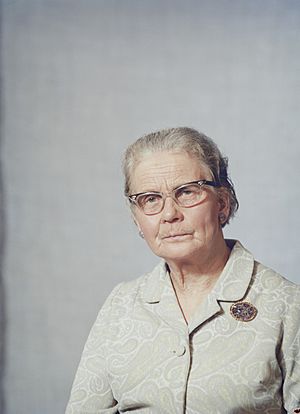Helvi Leiviskä facts for kids
Quick facts for kids
Helvi Leiviskä
|
|
|---|---|

Helvi Leiviskä in 1972.
|
|
| Born | 25 May 1902 Helsinki, Finland
|
| Died | 12 August 1982 Helsinki, Finland
|
| Occupation | Composer |
Helvi Lemmikki Leiviskä (born May 25, 1902 – died August 12, 1982) was a talented Finnish woman who loved music. She was a composer, which means she wrote music. She was also a writer, a music teacher, and worked as a librarian at the Sibelius Academy, a famous music school in Finland.
Contents
Helvi Leiviskä's Life Story
Helvi Leiviskä was born in 1902 in Helsinki, Finland. She loved music from a young age. In 1927, she finished her studies in music composition at the Helsinki Music Institute. This school is now known as the Sibelius Academy. There, she learned from a famous teacher named Erkki Melartin.
Continuing Her Music Education
After her studies in Finland, Helvi traveled to Vienna to learn even more about music. When she came back to Finland, she continued her studies with another important composer, Leevi Madetoja.
Her Career and Work
Helvi started her career as a composer in 1935. She also worked as a music teacher for many years, from 1922 to 1938. She taught music both privately and in public schools. In 1933, she got a job as a librarian at the Sibelius Academy. This meant she helped manage the music library at the school.
After World War II, Helvi kept learning and growing as a musician. She studied more with Leo Funtek. She also wrote articles and music reviews for newspapers like Ilta-Sanomat. Helvi Leiviskä passed away in Helsinki when she was 80 years old.
Helvi Leiviskä's Music
Helvi Leiviskä wrote many different kinds of music. Here are some of her important works:
- Piano Concerto, 1935 (a piece for piano and orchestra)
- Triple Fugue for Orchestra, 1938 (a complex piece for a large group of instruments)
- Symphony No. 1, 1947
- Symphony No. 2, 1954
- Symphony No. 3, 1971
- Sinfonia Brevis, 1962 (a shorter symphony)
- Folk Dance Suite (Kansantanssisarja), 1934 (music inspired by traditional dances)
- Hobgoblin of Darkness (Pimeän peikko), 1942
- The Lost Continent (Mennyt manner) for choir and orchestra, 1957
- Juha (film music), 1937 (music she wrote for a movie)
- Violin Sonata, 1945 (a piece for violin and piano)
- Piano Quartet, 1926 (a piece for four instruments, usually piano and three string instruments)
Awards and Recognition
Helvi Leiviskä received a special honor for her work.
- Pro Finlandia Medal, 1962 (This is an important award given in Finland to artists and writers.)
 | Claudette Colvin |
 | Myrlie Evers-Williams |
 | Alberta Odell Jones |

